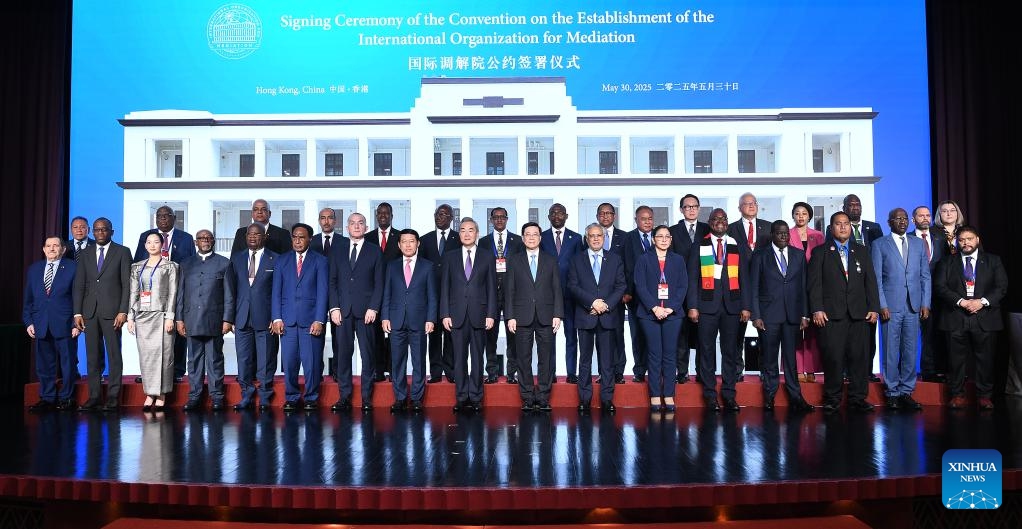
Chinese Foreign Minister Wang Yi, also a member of the Political Bureau of the Communist Party of China Central Committee, poses for a group photo with other guests at the signing ceremony of the Convention on the Establishment of the International Organization for Mediation (IOMed) in Hong Kong Special Administrative Region, on May 30, 2025. (Photo: Xinhua)
Following the recent signing ceremony of the Convention on the Establishment of the International Organization for Mediation (IOMed) in Hong Kong, the Secretary for Justice of the Hong Kong Special Administrative Region (HKSAR) Paul Lam Ting-kwok revealed Thursday that the mediation body would handle investment disputes between states and foreign nationals, and commercial disputes between private parties, which fall squarely within Hong Kong's strengths, according to local media reports in Hong Kong.
The objective and goal of the IOMed is to promote and facilitate the peaceful settlement of international disputes and to develop friendly relations and cooperation between countries through mediation, according to the HKSAR Department of Justice.
It will be the first international intergovernmental legal organization devoted to the use of mediation in resolving international disputes, and a beneficial supplement to the current international dispute settlement mechanism. It will also provide a new legal public good in international rule of law, marking a milestone in promoting the settlement of international disputes through mediation, the local authority said.
In a radio program by RTHK, Lam said the IOMed will handle three types of international disputes. Among them, disputes between sovereign states are not Hong Kong's strength, as Hong Kong is not a sovereign entity and lacks extensive diplomatic experience, he noted.
However, the other two types — investment disputes between states and individuals, and commercial disputes between private parties — are both business-oriented areas in which Hong Kong has accumulated considerable expertise, Lam said.
When asked whether the organization would handle the Russia-Ukraine conflict, Lam responded that while Hong Kong may not have many experts in that specific area, the central government has a strong pool of talent and is keen to use the mediation platform to help resolve such disputes.
The Hong Kong official noted that traditional mediation institutions have historically been established and led by Western countries, resulting in certain shortcomings in global dispute resolution. In contrast, the newly established IOMed, spearheaded by China, features a higher representation from the Global South and developing countries, filling a longstanding gap in the international dispute resolution landscape, according to local media reports.
The IOMed will later establish a secretariat and governing council, Lam revealed. Since it is an independent international institution with legal personality and privileges akin to those granted to foreign entities under statutory law, Hong Kong's specific role in the organization will need to be discussed and agreed upon through consultation, Lam said.
Regarding future mediators, Lam said that all signatory countries will be eligible to nominate their own nationals. Some mediators will focus specifically on state-to-state disputes, which require individuals with diplomatic and international experience. Each country may nominate up to five mediators for this category.
For general mediators handling commercial or other civil matters, each country can nominate up to 20 individuals. Founding member states will be allowed to nominate an even greater number of mediators, Lam said.
In addition, the governing council will also have the authority to nominate candidates. Nominees are not limited to nationals of signatory states — reflecting what Lam described as an "inclusive and open" approach.
Unlike traditional litigation and arbitration, mediation emphasizes consensus-building through negotiation, offering advantages such as lower costs, higher efficiency and greater flexibility — qualities that align with the international community's growing preference for peaceful dispute resolution, Willy Fu, a law professor who is also director of the Chinese Association of Hong Kong & Macao Studies, told the Global Times on Thursday.
The IOMed's establishment reflects China's advocacy of seeking harmony through settling disputes, or the Confucius "harmony principle" for social administration; it responds to the global demand for diversifying dispute-resolution mechanisms, Fu said.
"The IOMed will help countries find more constructive solutions to disputes in areas such as trade, investment and maritime rights, avoiding the prolonged deadlocks that adversarial legal proceedings may create," the expert said.